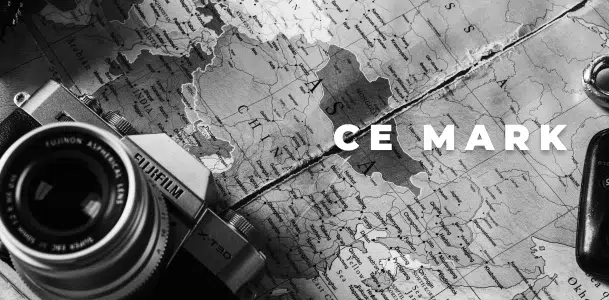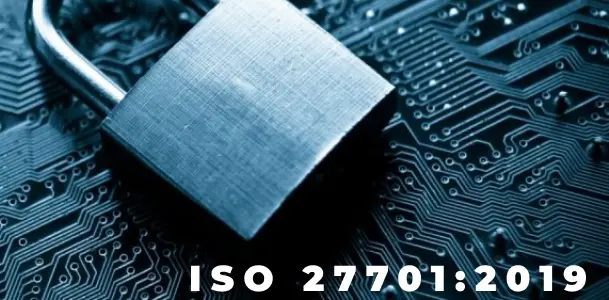FRANCE
ISO CERTIFICATION IN FRANCE
The effects of globalization on modern enterprises have prompted them to produce products for the worldwide market. Thus, this requires raising the standard of goods and services. A firm’s growth depends on ISO certification in France. The organization has to adhere to particular quality standards and regulations to take the business global. Nevertheless, ISO certification in France indicates that companies abide by stringent rules. In the changing French market, gaining consumer trust in goods and services requires ISO. Therefore, it raises the standard of good or service and broadens acceptability everywhere.
The ISO certification procedure was created in the middle of the 20th century to reassure consumers about the safety of their products. Thus, it guarantees workers work in a safe atmosphere as well. Therefore, ISO certification in France makes international trade easier and ensures the quality of the goods. The certification facilitates the company’s global expansion. An ISO-certified organization will provide customers with high-quality goods and services. For further information on ISO certification in France, read the whole writing.
WHY ISO CERTIFICATION IN FRANCE?
ISO in France is essential for your company as it creates many possibilities. ISO works hard to please the consumer and raises your company’s productivity. Again, having certification helps you reduce risks and seize chances. It increases your company’s flexibility in reaction to the shifting market. In France, ISO certification also lowers the possibility of reoccurring errors because of the record-keeping procedure.
Further, ISO certification in France supports company expansion and promotional initiatives. Therefore, such marketing for your company indicates that it satisfies worldwide standards, raising global market demand. Companies also require the ISO certification of their vendors before cooperation. Thus, ISO certification in France promotes staff members and prevents talent shortages in your company. Hence, ISO certification in France facilitates its maintenance on the international market.
UNDERSTANDING ISO CERTIFICATION IN FRANCE
ISO 9001 in France shows that a business is dedicated to delivering high-quality, trustworthy products and services. As the industrial landscape of France changes, so does the significance of the ISO 14001 standard, which stresses environmentally friendly growth. Thus, maintaining sensitive information aligns with ISO 27001, representing France’s commitment to digitalization. In addition., ISO certification increases customer confidence and enables companies to compete globally in the vast French market. Additionally, ISO certification streamlines processes reduces waste, and eliminates inefficiencies.
Companies in France may create robust frameworks in compliance with global best practices thanks to ISO certification. Thus, businesses prioritizing security, sustainability, and quality gain personally and raise France’s profile overseas. The International Organization for Standardization (ISO) publicly recognizes compliance to predefined standards in a company’s management system, procedures, goods, or services through certification. This independent, globally known organization develops and disseminates standards to ensure efficiency, safety, and quality in many industries. ISO-certified companies can demonstrate their commitment to quality and continuous improvement, which provides them a competitive edge. Hence, ISO 14001 certification emphasizes environmental management and sustainability.
Related Links
SOC 2 in France
ISO 27701 in France
GDPR in France
ISO 27018 in France
HIPAA in France
CCPA in France
PIPEDA in France
ISO 17025 in France
ISO 13485 in France
CE Mark in France
GDP in France
GLP in France
ISO 9001 in France
ISO 14001 in France
ISO 45001 in France
ISO 22000 in France
HACCP in France
ISO 22301 in France
ISO 21001 in France
ISO 41001 in France
ISO 20000-1 in France
Again, French suppliers participating in international supply chains must hold ISO accreditation. Continuous development is a keystone of ISO certification, which keeps French companies competitive and streamlines their processes. Finally, adherence to international quality standards and ISO certification raises a company’s profile and fosters confidence among clients and business partners.

STEPS in ISO CERTIFICATION PROCEdure IN FRANCE
Successful implementation of ISO certification in France requires the following actions. The procedures can be modified to fit the business’s demands.
Preparation and Awareness: Your firm’s objectives must be known before applying the ISO standards. Knowledge of the standards, advantages, and implementation procedure can facilitate controlled execution.
Planning: Sufficient planning can facilitate the efficient execution of strategy. Companies must identify the holes. The procedure also needs to create a risk mitigation strategy. Thus, preparing and executing the framework can improve your company’s compliance standing.
Documentation: Control implementation requires documentation to evaluate their efficacy. Control documentation facilitates the auditor’s external auditing and identification of the effects of put-in-place controls.
Implementation: ISO certification requires new control enforcement. Better results also need careful observation and modification of the implementation process.
Internal Audit: This evaluation of your company’s current practices highlights shortcomings. Hence, particular prerequisites must be met before the final audits.
Management Review: This assessment examines the success, utility, and expansion of the ISO application and makes recommendations for improvement.
Certification Body Selection: Certification bodies are different orgnaizations.Thus, certification bodies should be selected carefully, according to their experience and qualifications.
Stage 1 Audit (Document Review): This stage reviews procedures and paperwork to ensure they follow the rules, address any issues, and ensure the work satisfies established quality standards.
Stage 2 Audit (On-Site Audit): An external auditor performs the final audit once adjustments are made. This procedure obtains an ISO report and guarantees the absence of non-conformities.
Certification Decision: The ultimate aim of the certification procedure is to obtain an ISO audit report. If the auditor is happy with the findings, publish a written report. Nevertheless, the required adjustments should be made, and another audit should be requested if the auditor discovers problems with the procedure.
Surveillance Audits: Regulations are ensured to be obeyed by this. Consistently inspecting and monitoring the policies and procedures also increases their efficacy.
Alliances with auditing and consulting companies facilitate the certification procedure.
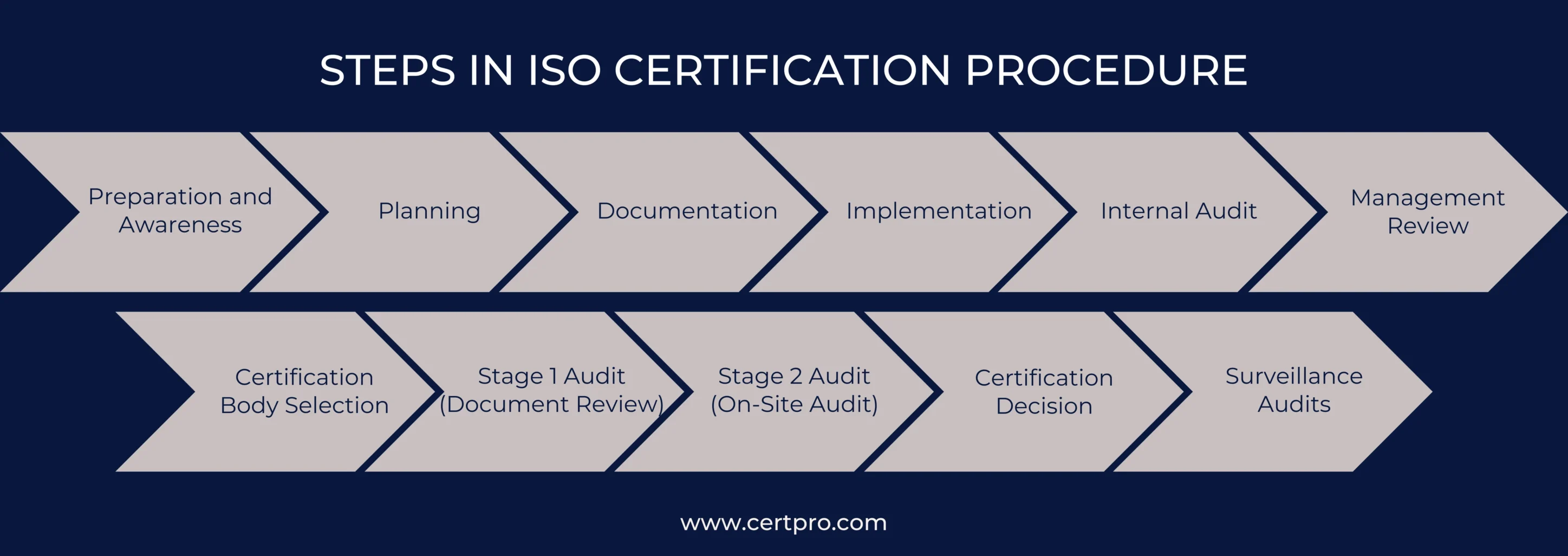
ISO CERTIFICATION PROCESSING TIME
Obtaining ISO certification in France takes at least three to six months. To become certified, one must mostly complete specific procedures. Businesses have to implement various methods for a while before their first audit. Furthermore, ISO certification is complicated; you can consult a specialist. In this sense, you could get assistance from CertPro, an ISO consultant in France. CertPro will help you to apply ISO correctly by enforcing the proper procedures. The annual surveillance is required, and the certification will last three years. You must collaborate with knowledgeable ISO professionals to align your company with ISO standards. It guarantees the right and sufficient completion of tasks.
CHECKLIST FOR ISO CERTIFICATION IN FRANCE
Make sure ISO standards are being met by using the audit schedule below:
Organizational Context Assessment: Understanding the company’s objectives concerning certification is good. Therefore, it facilitates the identification of internal and external elements as well as the expectations of stakeholders. Furthermore, the procedure helps to recognize any compliance concerns.
Leadership Evaluation: It demonstrates the company’s will to provide top-notch services and suggests that it can implement compliance.
Analysis of Strategic Planning: They must explain how they intend to modify the strategy if necessary. Other strategic planning guarantees are effective utilization of the company’s resources and risk management.
Support Systems Evaluation: A quality management system must be implemented. The procedure calls for the infrastructure, the working environment, knowledge, and methods.
Operational Processes Review: Organisations need to assess their offerings carefully. It gives them an understanding of their vulnerabilities. Once more, an external auditor’s more thorough examination of this procedure is necessary.
Performance Evaluation Procedures: The procedure offers means of monitoring and rating success. Thus, internal audits, management reviews, and consumer feedback surveys may be used.
Continuous Improvement Mechanisms: Plan initiatives that promote gradual system improvement. ISO recommendations state what has to be done to encourage ongoing expansion.
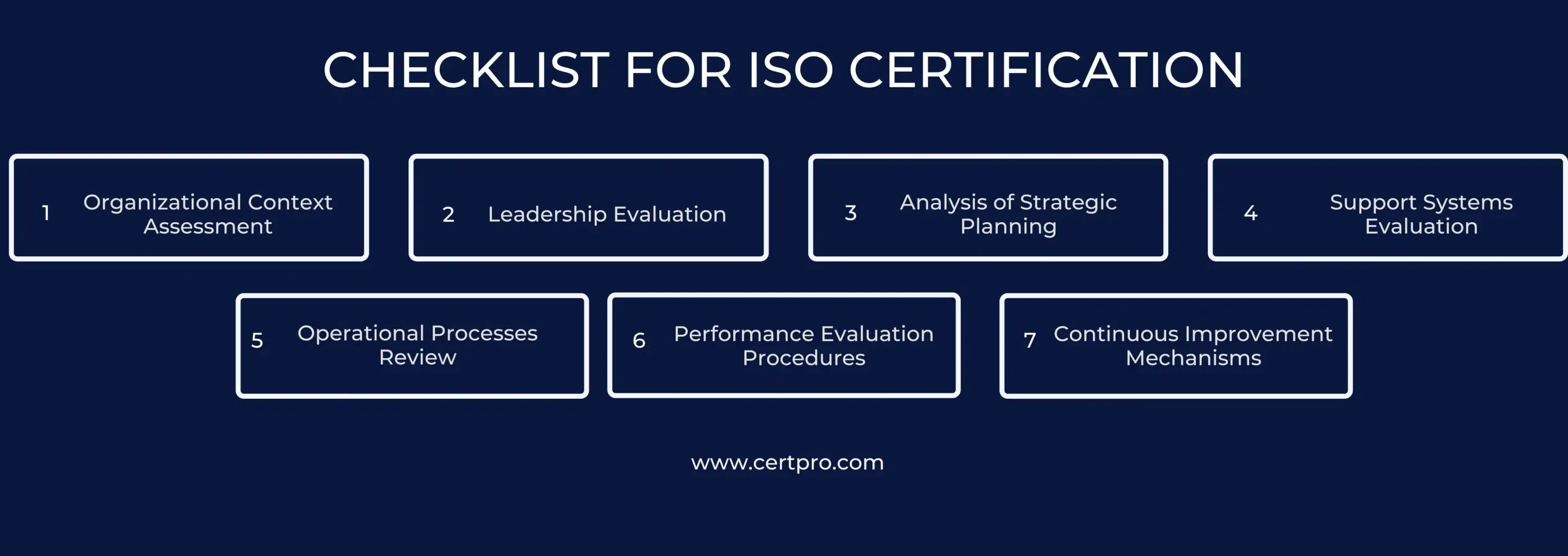
POPULAR ISO STANDARDS IN FRANCE
ISO standards significantly improve the security and quality control of many companies. The foundation of information security, ISO 27001, gives companies a complete framework for protecting their data and assets. Therefore, the international standard provides flexible choices for implementing robust information security management systems that cater to the specific needs of companies wishing to safeguard their information assets. Similarly, one particularly significant industry-specific standard for food safety is ISO 22000. The standards for a food safety management system emphasize the importance of maintaining hygienic practices in companies handling food products. Again, the importance of food safety is widely acknowledged. Hence, ISO 22000 is an essential standard that ensures food businesses adhere to stringent regulations to safeguard the welfare and health of their clients.
The ISO 13485 standard sets the specifications for medical device quality management systems for companies operating in the medical sector. This certification guarantees that businesses that manufacture medical equipment adhere to stringent quality and security standards. ISO 13485 is concerned with medical devices that are made in compliance with industry standards. Moreover, ISO 9001 is a well-recognized standard that benefits many different sectors. Its primary goals are operational improvement and customer satisfaction. Thus, companies of any size or industry may use it. Hence, ISO 9001 certification helps organizations enhance their processes, satisfy clients, and demonstrate legal compliance worldwide.
BENEFITS OF ISO CERTIFICATION IN FRANCE
The certification improves business growth and possibilities. It helps in developing a reputation and standards for the product and services. Here is a brief list of benefits are listed below:
Improve Staff Performance and Productivity: ISO certification in France improves the organization’s functionality. It provides a framework for employees to work together efficiently.
Transparent Processes: Auditors from outside the firm conduct an audit as part of the certification procedure. Therefore, it is easy to enhance, and a straightforward method is established. ISO standards also assist in demonstrating process metrics, improving working procedures, and improving overall items.
Improve Efficiency and Reduce Waste: Achieving ISO certification in France might accelerate your company’s expansion. It keeps the company functioning, reduces expenses, and disposes of waste. In addition, ISO certification in France establishes requirements for quality management systems that can increase a business’s profitability.
Improved Customer Satisfaction: An ISO certification in France demonstrates your company’s reliability to your customers. Obtaining ISO is a reliable means of showing your commitment to producing high-quality goods and employing effective processes. A firm in France receiving ISO accreditation has products and services that satisfy the highest international quality requirements.
International Adaptability: ISO in France certifies that its products and services satisfy stringent international requirements.
The standards guarantee that the business’s products and services satisfy international requirements. Thus, gaining ISO enables companies to operate from anywhere in the world, which promotes their expansion.
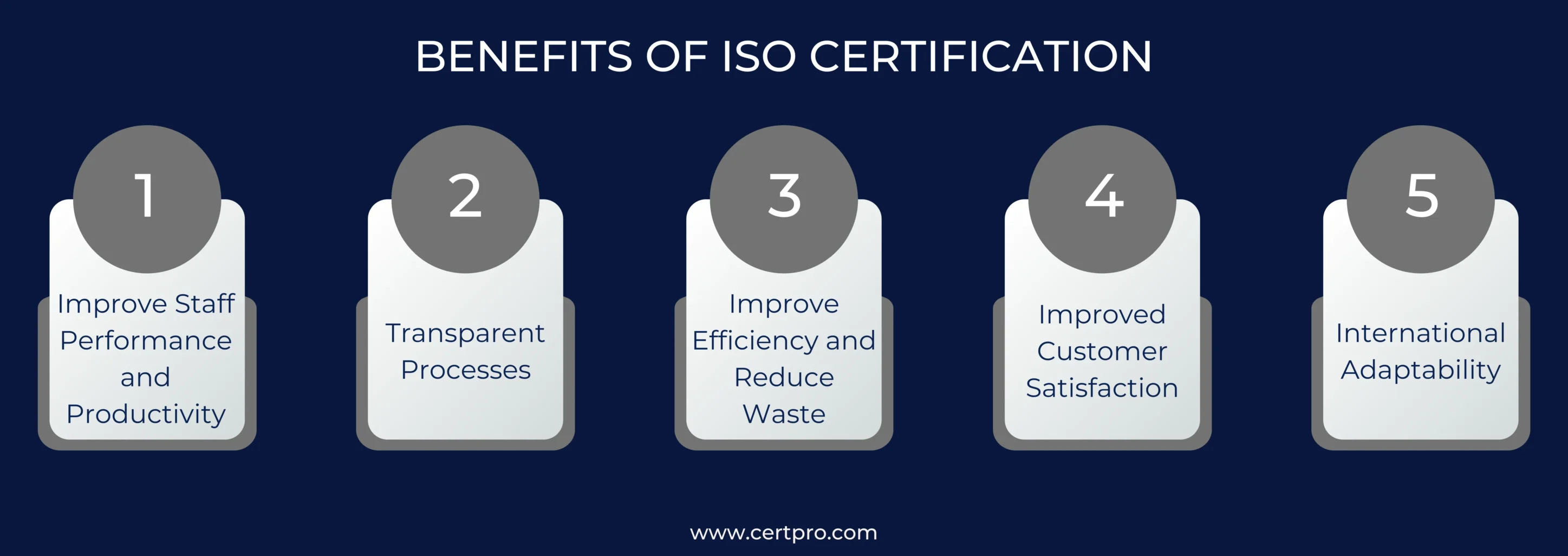
INDUSTRIES THAT BENEFIT FROM ISO CERTIFICATION IN FRANCE
Given its numerous advantages and substantial impact on many industries nationwide, many French companies have understood the value of ISO certification in accelerating their growth. Therefore, these certificates transcend basic status symbols and are dedicated to quality, security, and sustainability. For instance, the manufacturing sector benefits from ISO 9001 certification for higher operational efficiency and better product quality. Customers see ISO accreditation as a sign of reliability. Hence, this certification raises client happiness and gives companies a competitive edge in the market.
For France, ISO 27001 certification is essential in information technology since data is becoming increasingly important in modern society. This certification enhances risk management and data security procedures, which is necessary for the IT company to use technology developments. However, it is required to build client confidence in various contexts. Similarly, the ISO/TS 16949 standard ensures reliability and security. The nation’s healthcare system gains much from precision, legal compliance, and robust standards compliance.
These certifications support environmental building technology and sustainable building methods, influencing specific businesses. French companies use ISO consultants in France to guarantee conformity to ISO standards and to help them along the certification process. This dedication includes certifications from France that support data security, privacy, and healthcare standards: ISO 27001, SOC 2, GDPR, HIPAA, and PIPEDA. Applying for ISO certification in France is a commitment to both business success and broader social and environmental well-being. ISO consultants in France offer strategic direction to negotiate the certification process successfully.
CERTPRO: EMPOWERING YOUR BUSINESS TO ATTAIN ISO CERTIFICATION EFFORTLESSLY
ISO certification in France indicates that your company is reliable worldwide. However, certification costs in France can be high. In this regard, CertPro can help your business adhere to ISO standards. Being France ISO consultants in France, we abide by the regulations to provide our clients with the best possible service. Furthermore, our professionals will assist you in developing an approval process. CertPro additionally modifies the requirement according to the demands of the business. Once more, we will offer all the services needed for the certification and surveillance reporting procedures.
FAQ
What is the significance of ISO certification in France?
ISO certification in France is crucial for organizations across various sectors, signifying a strong commitment to international standards, quality, and sustainability. It enhances market competitiveness, operational efficiency, and confidence in global trade.
How can a company in France obtain ISO certification?
To achieve ISO certification in France, a company should undergo processes like certification preparation, implementation of ISO standards, internal audits, selection of a certification body, and completion of external audits.
What are the key benefits of ISO certification in France?
ISO Certification in France offers benefits such as increased reputation, improved market access, operational efficiency, enhanced customer trust, regulatory compliance, and alignment with sustainable practices.
Why is ISO 9001 certification significant for Danish organizations?
ISO 9001 certification in Denmark signifies a commitment to quality management, enabling companies to develop reliable and customer-focused goods and services. This certification is crucial for enhancing product quality and gaining a competitive advantage in the marketplace.
What are the essential steps in the ISO certification process in France?
The ISO certification process in France involves preparation, planning, documentation, implementation, internal audit, management review, certification body selection, document review, on-site audit, certification decision, and surveillance audits.
IT COMPLIANCE IN 2024: ESSENTIAL TRENDS AND BEST PRACTICES
IT compliance is essential for every organization to secure the integrity and accountability of data. The process also helps develop the business and enhance its profitability. In today’s digital era, IT compliance has more than just a regulatory checkbox. It plays a...
POLICY MANAGEMENT SYSTEM: ESSENTIAL TOOLS FOR AUTOMATION AND SIMPLIFICATION
Growing businesses indicates that you become a master in your field and accurately manage all business-related policies. However, managing company policies can be daunting significantly when your business expands. Here, an effective policy management system can help...
CYBERSECURITY AUDITS: A STEP-BY-STEP GUIDE TO CONDUCTING ONE
In recent years, data breaches have become headlines in many large companies. Technological advancements have made the hacking process more strategic and complicated. Therefore, organizations must consider the cybersecurity audit seriously to avoid breaches and have a...





